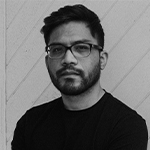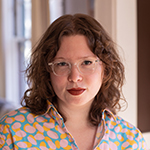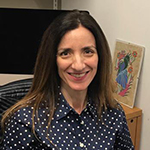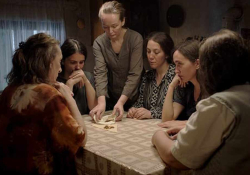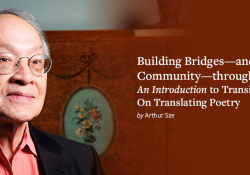Belaúnde (an excerpt)
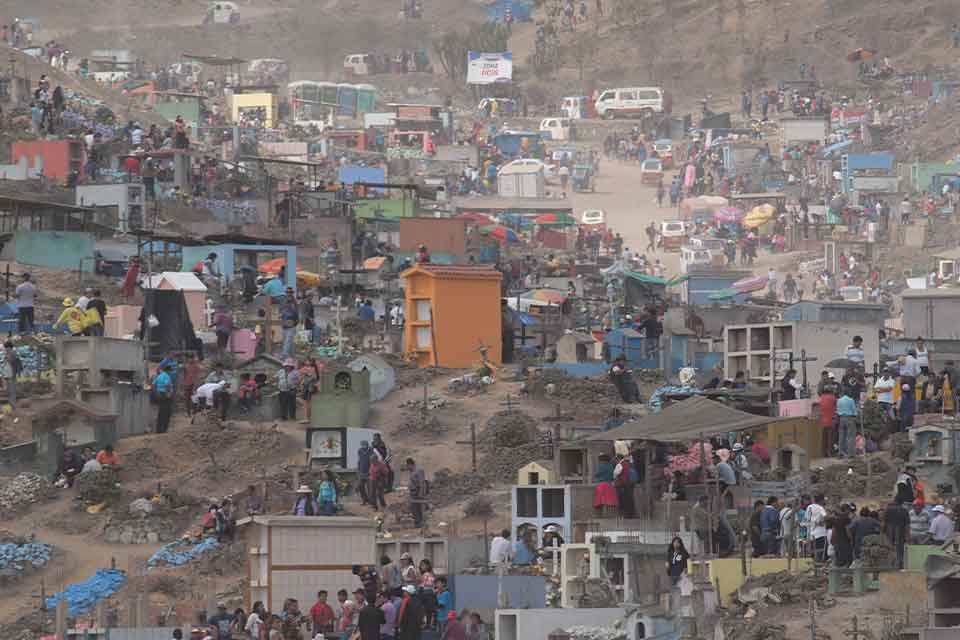
In these chronicles of funeral workers in Peru during the Covid-19 pandemic, families gather in a cemetery the size of fifty soccer fields to try to achieve more or less what we’ve been trying to achieve for millennia: to dispose of our dead with sufficient care and honor as proof that their lives deserved to be lived and remembered.
On this hilltop surrounded by fog, Luis Vásquez has been digging a grave since five in the morning. Half his body is inside a pit almost one and a half meters deep, two meters long, and eighty centimeters wide. He says that’s enough for a coffin to fit easily, and then nature does its thing: it takes about six years or so for a human corpse inside a coffin to decompose until only bones remain.
“Making room for the dead is a skill,” says the forty-year-old undertaker, without a mask or special suit, as he wipes the sweat from his dirty face. With a sledgehammer and chisel he has broken a huge stone, which he must now lever out with a crowbar. “With this one it’ll be like fifty Covid graves that I’ve dug by myself.”
The cemetery is called Mártires del 19 de Julio, also known as Belaúnde, and it’s as big as fifty soccer fields put together. Seen from above, the squatter settlement Carmen Alto, in the district of Comas in Lima—with its soccer pitches, mototaxis, stores, buses, and houses on the slopes of its hills—blends with the hundreds of tombs and niches that have been accumulating here since the 1960s: when entire families came from the Andes to the capital and founded districts that today form the so-called Conos.
Here they came to look for a place to live, but also a place to die. They formed settlements and also clandestine cemeteries, since they could not pay the costs of the funeral niches of the Beneficencia de Lima, let alone the private cemeteries. Then one night a neighbor searched the outskirts of the neighborhood for land that would be easy to dig up, without too many rocks, then dug a grave and buried the coffin of his relative. He left a mark to remember them: a mound of stones, a tombstone, a cross. Maybe he prayed. Then another family and another did the same, and the tombs and niches multiplied, without a blueprint or order, until they touched the ground where the newly arrived neighbors were building more and more houses.
It is difficult to distinguish where the city of the dead ends and where the city of the living begins.
Half a century later, from the top of this hill, it is difficult to distinguish where the city of the dead ends and where the city of the living begins. Especially because most of the space in the lower part of the cemetery has already been used up. Comas is the district that will register the fourth-highest number of Covid-19 deaths in the capital, some five thousand, during the first year of the emergency.
“There weren’t so many bodies during the cholera epidemic, but now it’s completely full,” Vásquez says, and he tells me that recently the municipality wanted to do a “census” in the cemetery. They wanted to know how many people were buried here. But after a while the officials gave up: it was useless to keep records in that labyrinth of tombs. How many graves are there, and how many have been lost in that chaos? That is why Luis Vásquez—son of a gravedigger named Juan de Dios, founder of this cemetery—is not surprised that only here is there room for new bodies, far up on the hill where he now works. The dozens of crosses that surround us, he says, are for the dead from the virus.
“It’s scary, brother, but you can’t say no to work, right?” says Vásquez while still chipping away at the stone. “The good thing is that I’m alone here. The infection is in the markets, on the buses, among the living. The cemetery is safer, believe it or not.”
Before the emergency, Vásquez dug four or five graves per month. Now, he digs one a day and charges 130 soles for it. The occupants of such graves, he says, are mostly elderly. An employee of the municipality, who manages the cemetery, would later tell me that out of every twenty daily burials, seven are confirmed cases of Covid-19, according to the death certificate. But Vásquez says he can tell at a glance: those coffins always arrive lined in plastic.
A while later, around nine, the first of the day would arrive.
Immediately, boys in black biohazard suits and industrial respirators came out to receive it. Seven family members—the maximum allowed here—entered through the blue cemetery façade accompanied by an employee of the municipality and reporters from a television network, somewhat alarmed by bony dogs that followed behind and wouldn’t stop barking. An old gravedigger told me that it had been a long time since he had seen so many journalists on this hill, at least not since word spread that there was a mausoleum here for former Shining Path militants, sentenced for terrorism in the 1980s and killed by the military during violent riots in three prisons in the capital.
Nothing remains of that construction: it was destroyed in 2018 by a tractor from the municipality, and the human remains were relocated to other areas of the cemetery. Now that barren land will be occupied by the dead of an unusual war, a war without weapons or slogans, which in just its first year and without the firing of a single bullet, would kill more than 180,000 Peruvians. That war, “against an invisible enemy,” according to the government narrative, is one that saturates our screens at all hours with disturbing images, such as those captured by the cameraman that morning: the gravediggers carrying the laminated wood coffin on their shoulders; the bereaved with masks, face shields, teary eyes; the official reporting the mayor’s “enormous efforts” in managing the response to the pandemic.
And at the top of the hill, a man continues digging a grave.
“Perú is a mountain crowned by a cemetery,” wrote Manuel González Prada, a particularly incendiary poet, about the devastation of the War of the Pacific more than a century ago.
It could be today’s headline—or an epitaph—on this side of the world.
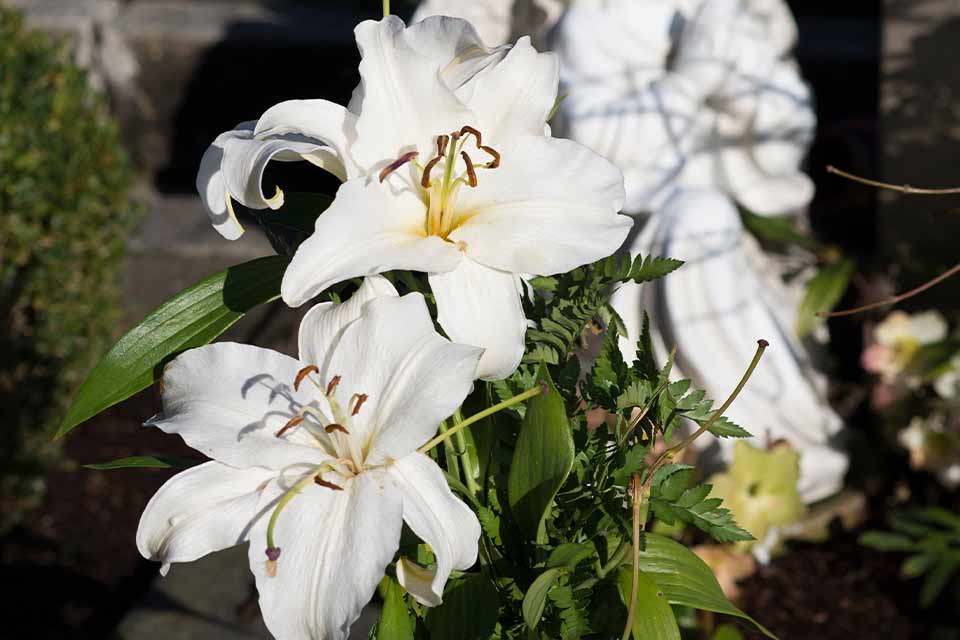
In the days of the virus, sometimes death arrives long before we begin to get sick. It starts with one decision.
In the days of the virus, sometimes death arrives long before we begin to get sick. It starts with one decision, apparently inoffensive, an unmemorable event.
We observe, for example, this man: Carlos Enrique Bravo, fifty-five, Comas resident. He endures two months of absolute lockdown, together with his wife and son, without working. Until one afternoon he does the math. The savings from his sneaker business are being depleted. The Universal Family Voucher, those 760 soles so publicized by the government, never arrived. And one must pay for the house, the bread, the electricity, the water. So, one day in June, at the height of the state of emergency, he gets up early, has breakfast, puts on a fabric mask, and decides to risk it: he goes out to offer his merchandise in the streets. He brings some money home, but a few days later he starts to feel bad. He coughs. Breathes with difficulty. The fever has him knocked out on his mattress. His wife brings him to a hospital in a state of collapse, where other men like him wait for a bed. We all know how this story ends.
A week later, in front of a coffin lined in plastic, a gray-haired, overweight man in a black jacket says of his friend:
Gordo Quique, you went ahead of us, but surely in some moment in life we will find each other. We’ll carry on talking, joking. We’re here to support Carlitos, he will not be alone. Gordo Quique, so, brother, I’ll follow you soon, wait for me. You know, save my spot.
An eleven-year-old boy, who has just lost his father, leaves a bouquet of white lilies on top of the coffin. He doesn’t cry, doesn’t say anything, just leaves his hand on the wooden lid a few more seconds, before it enters the niche. Then the gravedigger fits the gravestone, seals it with cement, and uses a stick to emboss it with the information of the deceased. There is no priest or pastor or anyone to lead the funeral oration, but everyone, friends and relatives, bows their heads for a minute, as if praying in silence.
Julia Penadillo, the widow, would tell me later that even though she also tested positive, she managed to recover at home. What really worried her was not having the money to bury her husband’s body. Without work or savings, by herself it was impossible to pay for:
400 soles to the municipality for the right to burial
1,500 soles to the builder to make the simplest niche
1,500 soles to the funeral home to collect the body from the hospital and bring it in a coffin to the cemetery
In this part of Lima, it costs a family almost four times the monthly minimum wage to bury a Covid-19 death.
The widow says that the SIS, Peru’s state-run public health system, which her husband was insured by, has not yet provided her with the reimbursement for funeral expenses that the neediest families are supposed to receive. She was told she had to wait for the quarantine to end.
“But I couldn’t wait,” she told me. “Thank God, his friends got the money together. I have some peace. At least my son and I know where his body is.”
Penadillo says that in her homeland, on a mountain in Huánuco, when someone dies, family members and friends eat, drink, and play music in the name of the dead. It’s what her husband would have wanted, she says. This custom of preserving and honoring someone’s body is perhaps due to pre-Hispanic reminiscences more than to Catholic rituals. In Memory and Death in Pre-Hispanic Perú, archaeologist Peter Kaulicke explains that said tradition is reflected in the closeness that our ancestors had with the mallqui, the mummy, that participated in the celebrations, something that Huamán Poma de Ayala had already recorded in his chronicles in the early seventeenth century: they took the body from the tomb, served it food and drink, dressed it luxuriously, carried it from house to house. The deceased was not to be abandoned but had to be treated as if it were alive, because the soul does not die.
Before the emergency, in this cemetery, entire families spent the day eating the favorite dishes of the deceased, drinking beer, and playing the music they liked when they were alive. Such gatherings are prohibited today. Julia Penadillo’s husband’s funeral lasted barely twenty minutes.
The day I visited the cemetery, I saw as many as four simultaneous burials. The gravediggers arrived at a pit or an empty niche, left the coffin there, and immediately got into an old truck to go down to the entrance to receive another body. There are about fifteen members of the Asociación de Trabajadores Independientes del Cementerio del Carmen, Atica. While the younger ones do the physical labor, its founders, the older ones, are still working. They negotiate contracts with the bereaved.
That’s how I met a gravedigger named Inocente Prudencio, seventy-eight, who doesn’t quarantine because “you have to eat and, besides, I get bored in my house.” And Horacio Mallanga, seventy-six, who has eleven children and four decades of scars on his hands from carving open graves. And Segundo Benítez, seventy-one, who has few teeth left and was baptized by the younger gravediggers as Uncle Covid. All of them, as members, have a reserved space in this cemetery. For now, they have the peace of mind of being safe: they were tested with rapid tests and received negative results. So far they have only lost three colleagues to the virus.
One of them was Manuel Puse Maco, another founder of the cemetery, better known as Comba. Something of a scoundrel, he was a foul-mouthed northerner with a large, square head like a huge sledgehammer. When the quarantine began, he drove to Chiclayo, on the north coast, carrying an infected relative. Comba was seventy-eight years old. He was diabetic, hypertensive. A month later he was in very serious condition at home, connected to an oxygen tank. One day he was rushed to the hospital in Collique, a twenty-minute drive from the cemetery.
“But only a body arrived,” says Víctor Puse, his second son. “Death doesn’t warn you when it’s your turn.”
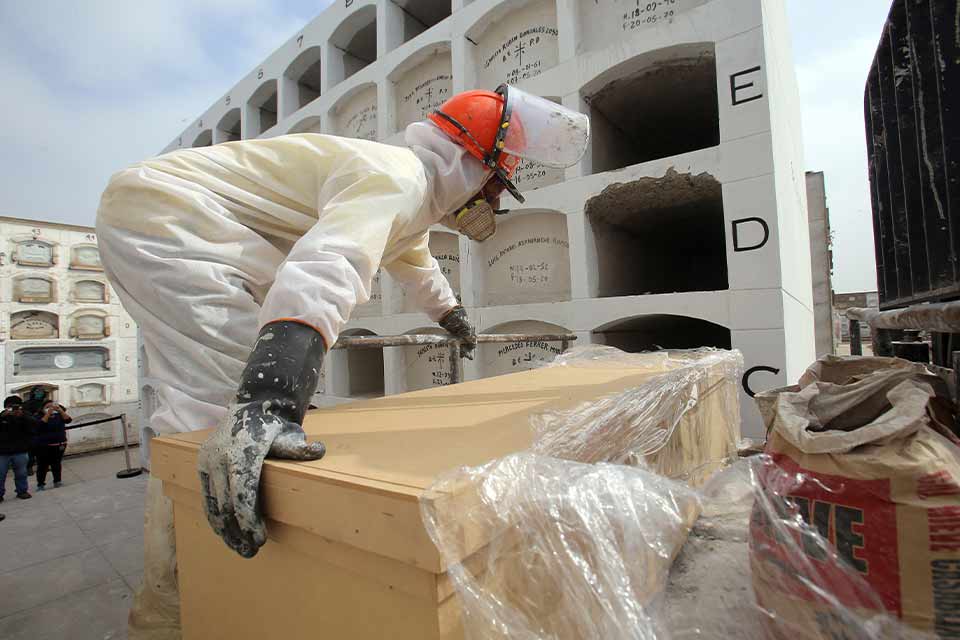
According to the association’s guidelines, the son of a gravedigger becomes a member when his father dies.
According to the association’s guidelines, the son of a gravedigger becomes a member when his father dies. That is why Víctor has inherited the blue vest, the cell phone, the old red car, and the clients of his deceased father. Now he works with three of his eleven siblings. He manages the contracts; they carry out the physical work.
“Everyone wanted to be buried by Mr. Comba,” the gravedigger Luis Vásquez told me. “He helped families dig the grave even when they did not have the money.”
Vásquez remembers that at the beginning of the Great Lockdown, the family of a young woman killed by her partner came to the cemetery. The body had been at the morgue for several days. The parents did not have the money to pay for someone to bury her. So the relatives went to a clear part of the hill to dig a ditch by themselves. Vásquez was so moved that he and his fellow gravediggers lent them a shovel, a pick, a rope, and gifted them a wooden cross. Just as old Comba, his neighbor and one of his teachers, had been in the habit of doing.
“Sometimes you give and God rewards you. Not everything is about money in this life.”
That is why today in Comba’s niche there are yellow lilies next to his picture all the time. And grapes and melons, his favorite fruits, and a bottle of Cristal beer, left by the people who knew him and loved him.
In his memoir The Undertaking, the US poet and funeral director Thomas Lynch says that, after a catastrophe, “the bodies of the dead are really important. We want them back to let them go again—on our own terms, at our pace, to say you may not leave without permission, forgiveness, our respects—to say we want our chance to say goodbye.”
And that is what the Yauli Bendezú family needs to do now. The grave dug earlier on the top of this hill must be occupied.
A few meters away from them are the men in their black biohazard suits who lower the coffin wrapped in plastic: one man inside the ditch, the other one, from above, holds by a rope the coffin that descends toward the darkness of the earth.
There goes the body of César Yauli, a beef merchant, who died of the virus at seventy-seven, a week after Alfonso, his younger brother, also died of Covid-19 and was buried in a cemetery where he had purchased a plot. In contrast, César did not have the time or the money to think about that. His niece Jocelyn Villegas tells me that at Cayetano Heredia National Hospital, in Lima Norte, they were offered the option of cremating or burying the body, but the family did not accept either from the hospital. They were terrified that the complaints they had seen on TV could be true: a woman claimed that the hospital had lost her husband’s body.
“We had to sign a paper that said we would take care of my uncle. We wanted to see him, to say goodbye like he deserves.”
Though they trust, Jocelyn insists, that the body inside the coffin they now lay to rest is truly their relative. She says they can do nothing else but trust. Covid-19 coffins, we understand, must not be opened.
The relatives were told that in this cemetery a Venezuelan priest known as Father Chamo usually performs the funeral rites. But since he is not here today, they settle for letting Oswaldo Marcelo, a thin man with a sharp nose, who makes his living singing at people’s burials, strum his acoustic guitar and play a somewhat off-key version of “I Have a Friend.”
The gravediggers throw the last shovels of dirt on the coffin.
“Okay, brothers and sisters, let’s make this heard, alright?” skinny Marcelo encourages them, and he shouts the name three times. “César Yauli Bendezú!”
“Here!”
The singer asks for a round of applause for the dead man, then asks for some coins. The relatives give him a few and the thin man strides down the hill, to play the same song at another burial. The nieces and nephews and siblings of the deceased stay to arrange the gravesite. They leave a wreath of red flowers, candles, golden heart-shaped balloons that say I miss you. They pound a white wooden cross into the ground and fence the grave with stones so that no distracted person steps on it and they themselves do not forget the place where their uncle rests. And so, while, elsewhere on the planet, millions of bodies are abandoned out of fear or neglect, the Yauli Bendezús try to achieve more or less what we’ve been trying to achieve for millennia: to dispose of our dead with sufficient care and honor as proof that their lives deserved to be lived and remembered. The certainty that, at the end of everything, there is still something of ours on earth.
Or that’s what we say to make ourselves feel better.
As they do now:
“My uncle was afraid that we would abandon him in the hospital.”
“He didn’t have children. That’s who we were for him.”
“His nickname, I remember, was Uncle Lolo.”
“He liked the number seven, he always bet seven at the casino.”
“At my niece’s wedding he got drunk. All night he was dancing and dancing.”
“He always remembered everybody’s birthdays.”
“He wasn’t perfect, like all of us, but Lolo was a good guy.”
“Even people who couldn’t stand him said goodbye to him on Facebook.”
“That’s it . . . As soon as you die, everyone loves you.”
That afternoon, at the end of the Great Lockdown, the Yauli Bendezús stayed a little while longer together at the altar of stones and flowers, telling stories about their uncle Lolo until the sky began to darken. Then we descended the slope carefully, linking arms so as not to fall on the graves. And so they left behind the hill, the crosses, and the dust that rose with each step, invading everything, even the air we breathed.
Lima

